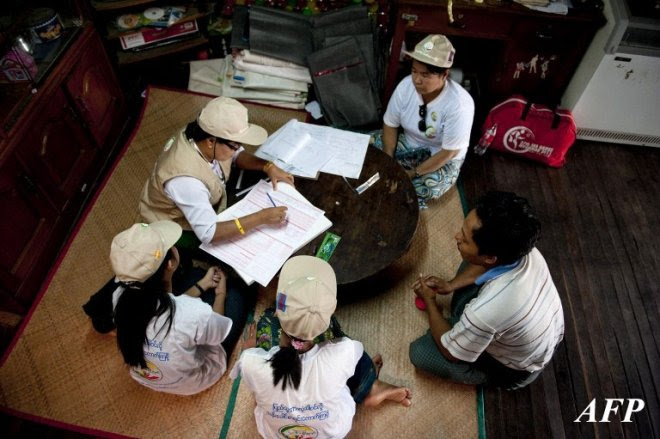The United Nations Population Fund has come under criticism from human rights groups over its role in the national census in Myanmar from March 30 to April 10.

The UNFPA has provided technical assistance to the Myanmar government for the census, which is the country’s first in 30 years.
The latest criticism follows the riots targeting the homes, offices and warehouses of UN agencies and international non-government organisations in the Rakhine State capital, Sittwe, late last month.
The riots followed protests in Rakhine State against ‘Rohingya’ being allowed as an ethnic category in the census.
In a statement issued on March 28 in response to reports linking the protests to the census, the UNFPA said: “The Government has made a commitment that everyone who is in the country will be counted in the census and all respondents will have the option to self-identify their ethnicity.”
But on March 29, presidential spokesperson U Ye Htut said ‘Rohingya’ would not be allowed as an ethnic category in the census.
“It will be acceptable if they write ‘Bengali’; we won’t accept them if they write ‘Rohingya’,” U Ye Htut.
In a statement issued on April 1, the UNFPA expressed concern about the government’s decision not to allow census respondents “who wish to self-identify their ethnicity as Rohingya to do so” and accused the government of breaching international standards for conducting a census.
Census tensions have focussed on Rakhine State but ethnic groups throughout Myanmar have long had concerns about the exercise.
The UNFPA was urged to consider postponing the census in a letter sent by about 30 ethnic, religious and other groups on December 16 last year.
The letter expressed disappointment that there had not been more consultation with ethnic organisations over the census and expressed concern about its possible negative implications for negotiations between the government and armed ethnic groups on a national ceasefire.
“We wonder about the advisability of conducting a census in March and April 2014,” the letter said.
“If possible, it may even be better to postpone the census until after the 2015 elections, or at least until we have further consulted with our communities,” it said.
A postponement of the census was also urged in a damning February 12 report issued by the Brussels-based think tank, the International Crisis Group, in which it warned that the data collection exercise risked inflaming tensions at a critical moment in the country’s peace process and democratic transition.
The UNFPA should not have dismissed earliercalls to postpone the census, London-based Minority Rights International said in a news release on April 2.
"MRG is disappointed that the UNFPA has not taken greater care toprotect the rights of minorities in [Myanmar]," MRG director Carl Soderberg said in the release.
"It now risks becoming complicit in the oppression of one of [Myanmar's] most vulnerable communities,” the release said, referring to the people who call themselves Rohingya.
A statement released by Human Rights Watch on March 28 had also recommended the census be postponed to avert the risk of further communal violence in Rakhine State.
"At greatest risk are vulnerable Muslim communities and aid workersfrom international organisations," the statement said.
It quoted HRW’s Asia director Brad Adams as saying that the recent mob violence against foreign aid staff in Sittwe illustratedthe risks of proceeding with the census in such a volatile environment.
"The government should suspend the census until it can ensure adequatesecurity and fair process for everyone involved," Mr Adams said.
HRW also noted in its statement that ethnic community groups hadexpressed concern that both the Ministry of Immigration and Population and the UNFPA had not consulted more broadly over the census process.
The UNFPA did not hold its first independentconsultation with ethnic groups without the presence of governmentofficials until March 17, the HRW statement said.
The UNFPA has declined to respond to the calls about postponing the census.
"I'm not going to comment on that," UNFPA spokesperson William Ryan told Mizzima Business Weekly in a telephone interview on April 4.
"We're trying to get the best standard now of something that's startedand we're trying to ensure that it's completed as best as possible,"Mr Ryan said.
Asked if the UNFPA expected to be satisfied with the outcome of the census, Mr Ryan said:
"The process is very complex, there has been lots of preparation andextensive training.
"We're trying to concentrate on completing the census as best we canand, yes, there will be many lessons learned but the time to reflectwill be further down the track," he said.



